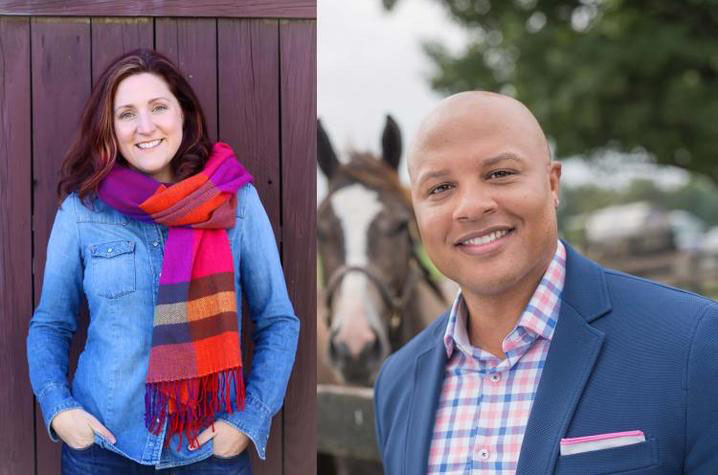UK Bourbon Industry Conference Explores Diversity, Equity and Inclusion in the Spirits’ Sector

As chairwoman of the board for the Kentucky Distillers’ Association, Jessica Pendergrass said 2020 was a year that required action and change, not just words, when it came to diversity, equity and inclusion. She is only the third woman chair of the board in its 140 years.
Pendergrass will co-chair a panel discussion March 12 during the James B. Beam Institute for Kentucky Spirits' virtual Bourbon Industry Conference. Panelists will discuss their experiences in their own career paths and field questions from conference attendees.
“Women in leadership are often questioned and held to a different standard than men. Our skillset is analyzed, our intentions are questioned, our communication style is scrutinized, and we are asked to seek a second opinion from men when advising on a topic,” said Pendergrass, general counsel and chief compliance officer for Heaven Hill Distilleries Inc. “It is a challenging balance to try and navigate, particularly when we see communication styles attributed to men valued in the American workplace, but women are not appreciated when exhibiting those same styles. I feel blessed to work at Heaven Hill, where a significant percentage of our leadership is women.”
Joining Pendergrass on the panel are co-chair Andrea Meriwether, director of brand strategy and innovation for TKT & Associates; Hannah Lowen, vice president of operations for New Riff Distilling; Chelsea Nichols, distillery associate for Michter’s Distillery; and Gathan Borden, vice president of marketing for VisitLEX and founding member of the Kentucky Black Bourbon Guild.
Borden said he’s always been one of a handful of African Americans working in Kentucky’s tourism industry. He said that number becomes even smaller when looking at leadership roles in the whole tourism industry. He said he has had many experiences of not having his voice and viewpoint heard when it comes to decision making, but challenges exist on a broader scale.
“The biggest challenge the industry has is recovering from the lack of documentation of the contributions of African Americans and the historical role they’ve played in the bourbon industry,” he said. “We have to restore that history to bring African Americans in as consumers and as part of the workforce. There is still so much to do.”
Borden said that 2020 brought increased pressure for accountability by the affinity groups of the bourbon industry.
“We are now seeing brands start to be more vocal and visible in their work support of diversity, equity and inclusion efforts,” he said. “The industry is bringing these groups to the table to have open dialogues and discussions around race in the spirits industry. We are also seeing the brands now hire diversity positions and put women and BIPOC professionals in leadership and decision-making roles within the organizations. Peeling back the underlying layers of racism and sexism is a daunting task and major challenge for the industry.”
Nichols began working in her current role at Michter’s in 2019 after working for a year at Old Forester Distillery. She said she hopes that diversity, equity and inclusion is more than a trend, and she emphasized that people embracing change is what will sustain the industry’s current efforts.
“I’ve met people who truly want a diverse industry,” she said. “As long as we continue to make room for those who want to see change and who know how to execute change, I believe the industry can be more diverse.”
James B. Beam Institute for Kentucky Spirits Director Seth DeBolt said the panel is a chance for participants to learn more about the industry’s diversity, equity and inclusion efforts and be able to be part of the discussion.
“The growth of the industry and potential for innovation requires a diverse workforce to advance sustainability and innovation,” DeBolt said. “Career options are broad and range from business and marketing to personnel technically trained in science, technology, engineering and math disciplines with backgrounds in distillation, wine and brewing. The Kentucky Distillers’ Assocation Scholars program will ensure that we prepare underrepresented students for a dynamic career in the spirits industry or give them a foundation for deeper studies.”
“I believe the bourbon industry is working to make long-term, sustainable changes in diversity, equity and inclusion,” Pendergrass said. “The most important work we started in 2020 was the creation of the KDA Diversity, Equity and Inclusion advisory panel and the KDA Diversity Scholars programs at UK, University of Louisville and Kentucky State University. The Beam Institute has really taken the lead on the scholars initiative.”
The Beam Institute and the Kentucky Distillers’ Association established the scholars program to fund scholarships aimed at increasing diversity in the distilled spirits industry. The KDA UK Scholars Program Fund will annually support full tuition for up to four students in UK’s Distillation, Wine and Brewing Studies program.
For more information, visit the Beam Institute website at http://beaminstitute.ca.uky.edu. Although the 2021 Bourbon Industry Conference is already underway, participants may still register and virtually attend the rest of the events, including the March 12 Diversity, Equity and Inclusion panel discussion.
The James B. Beam Institute for Kentucky Spirits ensures the welfare and prosperity of Kentucky’s spirits industry. Through teaching, research and outreach, the Institute promotes economic sustainability, environmental stewardship and responsible consumption. The Beam Institute is a multidisciplinary effort of experts from the UK College of Agriculture, Food and Environment, College of Engineering, College of Arts and Sciences, and Gatton College of Business and Economics.
More from this series Research Priorities - Diversity & Inclusion
Credits
Aimee Nielson (College of Agriculture, Food and Environment)


